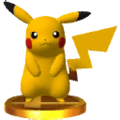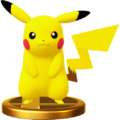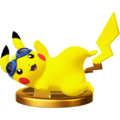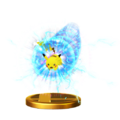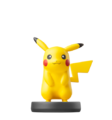Pikachu (SSB4): Difference between revisions
Blueowens21 (talk | contribs) (Typo) Tag: Mobile edit |
Blueowens21 (talk | contribs) (Add content) Tag: Mobile edit |
||
| Line 16: | Line 16: | ||
Pikachu is currently ranked 5th out of 56 on the [[tier list]], placing it in the A tier and results in it being the second highest ranking high-tier character. This is a slight improvement from its ranking of 8th out of 38 in ''Brawl'' and continues its trend of being a high-tier character. Pikachu's positives include its high speed, good combo game, good approach, good neutral game courtesy of [[Thunder Jolt]] and excellent recovery courtesy of [[Quick Attack]]. However, it has notable weaknesses to balance this out, as it has poor survivability due to its low [[weight]] and weak KO potential. This gives Pikachu a high learning curve and small high-level representation compared to other high-tier characters, but it has nonetheless seen notable tournament results, mostly credited to {{Sm|ESAM}}. | Pikachu is currently ranked 5th out of 56 on the [[tier list]], placing it in the A tier and results in it being the second highest ranking high-tier character. This is a slight improvement from its ranking of 8th out of 38 in ''Brawl'' and continues its trend of being a high-tier character. Pikachu's positives include its high speed, good combo game, good approach, good neutral game courtesy of [[Thunder Jolt]] and excellent recovery courtesy of [[Quick Attack]]. However, it has notable weaknesses to balance this out, as it has poor survivability due to its low [[weight]] and weak KO potential. This gives Pikachu a high learning curve and small high-level representation compared to other high-tier characters, but it has nonetheless seen notable tournament results, mostly credited to {{Sm|ESAM}}. | ||
The overall competitive community opinion of Pikachu has been volatile since the ''SSB4''{{'}}s release. Initially, it was widely seen as an average character, but after a number of impressive tournament showings by ESAM (including his brief period of retirement having added to the "mystery" of Pikachu's potential), was seen as high as a top 3 character by players like {{Sm|ZeRo}} and ESAM himself, culminating in an extremely close Winners' Finals set at [[Super Smash Con]] between the two. In more recent times however, public opinion has swayed again; many consider Pikachu's ranking on the first official tier list to be far too high due to metagame development, introduction of new high-tier characters, game updates, ESAM's inconsistent showings at major tournaments and a dearth of results for Pikachu at national, regional, and even local levels of play. Though update [[1.1.5]] nerfed some of Pikachu's hardest match-ups, its current ranking on the tier list is still heavily disputed, with many players now believing Pikachu to no longer | The overall competitive community opinion of Pikachu has been volatile since the ''SSB4''{{'}}s release. Initially, it was widely seen as an average character, but after a number of impressive tournament showings by ESAM (including his brief period of retirement having added to the "mystery" of Pikachu's potential), was seen as high as a top 3 character by players like {{Sm|ZeRo}} and ESAM himself, culminating in an extremely close Winners' Finals set at [[Super Smash Con]] between the two. In more recent times however, public opinion has swayed again; many consider Pikachu's ranking on the first official tier list to be far too high due to metagame development, introduction of new high-tier characters, game updates, ESAM's inconsistent showings at major tournaments and a dearth of results for Pikachu at national, regional, and even local levels of play. Though update [[1.1.5]] nerfed some of Pikachu's hardest match-ups, its current ranking on the tier list is still heavily disputed, with many players, such as ZeRo, now believing Pikachu to no longer being in the top ten of the tier list. | ||
==Attributes== | ==Attributes== | ||
Revision as of 18:27, July 12, 2016
| Pikachu in Super Smash Bros. 4 | |
|---|---|
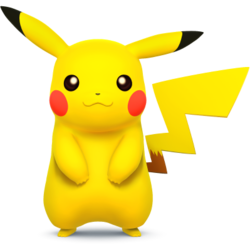 
| |
| Universe | Pokémon |
| Other playable appearances | in SSB in Melee in Brawl |
| Availability | Starter |
| Final Smash | Volt Tackle |
| Tier | A (5) |
Pikachu (ピカチュウ, Pikachu) is a playable character in Super Smash Bros. 4. Its return to the series was confirmed on June 11th, 2013 during E3 2013, while it was also among the first wave of amiibo. Ikue Ohtani reprises her role as Pikachu's voice actor, albeit via recycled voice clips from Melee and Brawl.
Pikachu is currently ranked 5th out of 56 on the tier list, placing it in the A tier and results in it being the second highest ranking high-tier character. This is a slight improvement from its ranking of 8th out of 38 in Brawl and continues its trend of being a high-tier character. Pikachu's positives include its high speed, good combo game, good approach, good neutral game courtesy of Thunder Jolt and excellent recovery courtesy of Quick Attack. However, it has notable weaknesses to balance this out, as it has poor survivability due to its low weight and weak KO potential. This gives Pikachu a high learning curve and small high-level representation compared to other high-tier characters, but it has nonetheless seen notable tournament results, mostly credited to ESAM.
The overall competitive community opinion of Pikachu has been volatile since the SSB4's release. Initially, it was widely seen as an average character, but after a number of impressive tournament showings by ESAM (including his brief period of retirement having added to the "mystery" of Pikachu's potential), was seen as high as a top 3 character by players like ZeRo and ESAM himself, culminating in an extremely close Winners' Finals set at Super Smash Con between the two. In more recent times however, public opinion has swayed again; many consider Pikachu's ranking on the first official tier list to be far too high due to metagame development, introduction of new high-tier characters, game updates, ESAM's inconsistent showings at major tournaments and a dearth of results for Pikachu at national, regional, and even local levels of play. Though update 1.1.5 nerfed some of Pikachu's hardest match-ups, its current ranking on the tier list is still heavily disputed, with many players, such as ZeRo, now believing Pikachu to no longer being in the top ten of the tier list.
Attributes
Pikachu is a small, light, and agile character. Pikachu has fast dashing and walking speeds, moderate falling speed, above average gravity, below average air speed, and high air acceleration. It is also tied for the sixth lightest weight. It sports a quick 4-frame jumpsquat, and with average traction and a relatively long initial dash (14 frames), Pikachu benefits from a moderately long perfect pivot; however, such attributes give it a slow extended dash dance and fox-trot.
Perhaps Pikachu's greatest strength is its flexible approach. Quick Attack is an excellent mobility option, and due to its two-hit nature, it allows Pikachu to weave in and out of danger, and can be used to start combos. Quick Attack can also be ledge-cancelled, granting even faster movement with the aid of platforms. With this technique, Pikachu can chase opponents and keep up pressure without much risk to itself. Thunder Jolt is a useful projectile, and has good utility in zoning and forcing approaches. Pikachu can take advantage of its quick dashing and walking speeds, short-hop, and pivot, with these traits further aiding its strong neutral game.
Another advantage Pikachu has is its frame data. Most of its attacks come out in 10 frames or less, including its up smash, which is its strongest move. Combined with their low power, this fast attack speed gives Pikachu a formidable combo game. Up aerial can combo into itself and any other aerial. Up tilt can repeatedly chain into itself at lower percents, and its low knockback growth allows it to combo into aerials at higher percents. Down tilt has a chance to trip opponents, leaving them open to a grab. Pikachu's grab game is the centerpiece of its combo ability. Its forward throw can lead into a dash attack or up smash, while down throw launches opponents into the air right above Pikachu, setting them up for aerial combos and juggles. At very high percents, both down and up throws are capable of chaining into Thunder, KOing if the spiking hitbox is landed.
Finally, Pikachu possesses a superb recovery. Skull Bash, though linear and telegraphed, is chargeable and deals high knockback while not rendering Pikachu helpless. Quick Attack can be angled in two consecutive directions and, along with its speed, this makes it a very unpredictable and difficult move to intercept, as well as a favorable recovery option from virtually any position offstage. This contributes to an effective edge-guarding game. Though Pikachu's aerials are not particularly strong, it has the luxury of going far off-stage and challenging recovering opponents while still being able to recover itself.
However, Pikachu has notable flaws. It suffers from poor reach, as most of its attacks have hitboxes very close to its body. For a character of its speed, Pikachu's aerials have abnormally high landing lag, with its down aerial having an enormous 40 frames of landing lag, being tied for the highest of any aerial in the game. Combined with the previous point, Pikachu cannot efficiently use its aerials to approach and pressure (aside from forward aerial), leaving it susceptible to characters with capable aerial approaches, notably Sheik, and this issue is made worse by its relatively slow air speed.
Even with its powerful combo game, Pikachu's damage output is overall poor, and it commonly takes time for opponents to be brought to KOing range, where another issue is presented: Pikachu has significant trouble KOing. Its set-ups off of up and down throws into Thunder require reads and proper spacing and timing. Aside from these few situations, it has no reliable set-ups into its KO moves. Up smash has short reach and high ending lag, and is thus very punishable. Though it has good range, forward smash has noticeable start-up, and down smash is relatively weak; both have high ending lag, and the latter has short range. Pikachu's edge-guarding ability has its flaws: its aerials aren't very strong, and its neutral, forward, back and down aerials have long durations and small hitboxes.
Pikachu's most glaring flaw is its survivability. Its small size, low weight, and average falling speed make it difficult to combo; however, along with its relatively high gravity, these attributes leave it susceptible to KOs. The rage mechanic further exacerbates this problem, since Pikachu's opponents commonly survive to very high damages, while it cannot reliably take advantage of the mechanic as a result of its endurance. While its impressive recovery somewhat mitigates its survivability issues, Quick Attack is a difficult move to master. When using it for fast movement, inexperienced players can often veer offstage with it, or angle it the wrong way and miss the ledge entirely when recovering, causing Pikachu to fall helplessly and self-destruct.
Despite Pikachu receiving little benefit from customs, they still have their uses. Thunder Wave paralyzes grounded opponents, opening up opportunities for follow-ups at the cost of having much less range. Heavy Skull Bash moves and charges faster, and has immense power if used at point-blank range. Meteor Quick Attack reduces distance traveled, but as the name implies, the entire move is a meteor smash, with much higher knockback at the start of each warp. Quick Feet increases distance traveled and has more power as well, but it loses its unpredictability, as it only moves once. While Distant Thunder has more start-up and a much weaker discharge around Pikachu, it has more vertical range, much more power near the thundercloud, and cannot meteor smash. This allows for easier Thunderspiking, which restores most of its usefulness from Super Smash Bros.
Overall, Pikachu is a notably viable character, thanks to its mobility, attack speed, combo game and versatile recovery. However, it has a high learning curve, largely due to the skill required for proper use of Quick Attack and its heavy reliance on reads to KO, though its strengths generally make up for these flaws. While Pikachu has low tournament representation, the efforts of a few dedicated mains such as ESAM have gained it strong tournament results. In spite of this, some resent its high-tier placing due to ESAM being the only notable Pikachu main that can place well in tournaments in general and himself having inconsistent results when playing as Pikachu.
Changes from Brawl
Pikachu received a mix of buffs and nerfs in the transition to SSB4. The changes to hitstun canceling greatly aid its combo game and gives it a few notable KO set-ups from its throws, while its up and forward smashes have become stronger, with the former having regained some of its power from Melee. Pikachu has also gained access to a new technique know as the Quick Attack ledge cancel, which gives Quick Attack new mobility options when used with ledges and platforms. As many of its moves deal electric damage, it benefits from the increased shieldstun. A few of its moves' ranges were increased, such as its forward tilt, dash attack, and down aerial, somewhat mitigating one of its more glaring issues.
However, Pikachu has also received significant nerfs. Quick Attack can no longer be canceled into the ground, making it less flexible as an approach option, and its new Quick Attack ledge cancel technique does not fully compensate for this. Pikachu's grab game, a major reason behind its success in Brawl, has been heavily nerfed: its grab range is shorter, its up and down throws deal less damage, with the latter's increased knockback scaling worsening its combo potential at higher percents, and with the removal of chain-grabbing, Pikachu can no longer perform highly damaging chain-grabs with its forward and down throws. While the changes to hitstun have given it new combos, they are nonetheless inferior to its lost chain-grabbing ability, and along with the reduced damage on most of its attacks, such changes notably worsen its already low damage output. Though the new ledge mechanics boost its already impressive recovery, they also give it a more difficult time edge-guarding, especially with the improved recoveries of the rest of the cast, and the introduction to rage worsens its endurance.
Although Pikachu was a high-tier character in Brawl, its ranking in SSB4 is mixed; some consider it to be even better than in Brawl, while some think it should not be ranked as highly in SSB4's high-level play, let alone worse than it was in Brawl. Despite having a rather small playerbase in competitive play due to its very high learning curve and degree of technical skill required, Pikachu is still considered a notable force in the metagame thanks to players such as ESAM, but whether or not Pikachu should be at its current ranking on the tier list is debatable among the SSB4 competitive community due to its below-average representation compared to other high-tier characters.
Aesthetics
 Pikachu's appearance has been updated to match the latest Pokémon core series games and PokéPark Wii: Pikachu's Adventure, as its model has been altered and continues the trend of being gradually less chubby with each subsequent appearance in the Super Smash Bros. series. Pikachu's coloration is also considerably brighter in comparison to its previous appearances.
Pikachu's appearance has been updated to match the latest Pokémon core series games and PokéPark Wii: Pikachu's Adventure, as its model has been altered and continues the trend of being gradually less chubby with each subsequent appearance in the Super Smash Bros. series. Pikachu's coloration is also considerably brighter in comparison to its previous appearances. Pikachu is more expressive. It now smiles more often when attacking, grimaces when being grabbed and after landing upon being launched, and even sports swirly eyes when its shield is broken, the latter of which is a reference to a Pokémon's fainted expression in the anime.
Pikachu is more expressive. It now smiles more often when attacking, grimaces when being grabbed and after landing upon being launched, and even sports swirly eyes when its shield is broken, the latter of which is a reference to a Pokémon's fainted expression in the anime. Pikachu is more bipedal.
Pikachu is more bipedal. Walk's animation has slightly changed. Pikachu now walks in a more slanted movement.
Walk's animation has slightly changed. Pikachu now walks in a more slanted movement.
Attributes
Ground attacks
 Neutral attack deals less damage (2% → 1.4%/1.2%/1%).
Neutral attack deals less damage (2% → 1.4%/1.2%/1%). Neutral attack has slightly improved jab lock potential.
Neutral attack has slightly improved jab lock potential. Neutral attack pushes away opponents rather than keeping them in place.
Neutral attack pushes away opponents rather than keeping them in place. Forward tilt and dash attack have increased range.
Forward tilt and dash attack have increased range. Forward tilt has increased start-up and a shorter hitbox duration (frame 5-10 → 6-8).
Forward tilt has increased start-up and a shorter hitbox duration (frame 5-10 → 6-8). Up tilt deals less damage (7%/6%/5% → 5%) and increased ending lag (24 frames → 27).
Up tilt deals less damage (7%/6%/5% → 5%) and increased ending lag (24 frames → 27). Up tilt has decreased knockback growth, improving its combo potential to the point that it is very useful for combos at a variety of percents.
Up tilt has decreased knockback growth, improving its combo potential to the point that it is very useful for combos at a variety of percents. Down tilt deals 1% less damage (7% → 6%), has decreased reach and 1 less active frame.
Down tilt deals 1% less damage (7% → 6%), has decreased reach and 1 less active frame. Down tilt has decreased knockback, improving its combo potential to the point that it can now combo into aerial attacks.
Down tilt has decreased knockback, improving its combo potential to the point that it can now combo into aerial attacks. Dash attack now has a sweetspot and a sourspot (7% → 10% (sweetspot)/6% (sourspot)).
Dash attack now has a sweetspot and a sourspot (7% → 10% (sweetspot)/6% (sourspot)). Sweetspotted and sourspotted dash attack has increased knockback.
Sweetspotted and sourspotted dash attack has increased knockback. Dash attack comes out 1 frame later (frame 5 → 6).
Dash attack comes out 1 frame later (frame 5 → 6). Clean forward smash deals 1% more damage (17% → 18%) and its hitbox is larger.
Clean forward smash deals 1% more damage (17% → 18%) and its hitbox is larger. Early and late forward smash deals less damage (20% (early)/14% (late) → 15%/12%) and has decreased range.
Early and late forward smash deals less damage (20% (early)/14% (late) → 15%/12%) and has decreased range. Forward smash hits twice and has decreased ending lag.
Forward smash hits twice and has decreased ending lag. Forward and down smashes are much harder to SDI out of.
Forward and down smashes are much harder to SDI out of. Forward smash's animation has slightly changed. Pikachu now stands on one of its hind legs while charging and using it.
Forward smash's animation has slightly changed. Pikachu now stands on one of its hind legs while charging and using it. Sourspotted up smash has decreased knockback and hitstun during its very last few frames, to the point that it is nearly useless.
Sourspotted up smash has decreased knockback and hitstun during its very last few frames, to the point that it is nearly useless. Up smash has increased knockback, to the point that it can KO under 90% when sweetspotted. It has also received utility by becoming capable of partaking in combos and punishing rolls.
Up smash has increased knockback, to the point that it can KO under 90% when sweetspotted. It has also received utility by becoming capable of partaking in combos and punishing rolls. Up smash comes out 1 frame later and has increased ending lag.
Up smash comes out 1 frame later and has increased ending lag. Down smash deals 2% less damage (15% → 13%) due to consisting of six hits instead of seven. It also has increased start-up and ending lag.
Down smash deals 2% less damage (15% → 13%) due to consisting of six hits instead of seven. It also has increased start-up and ending lag. Down smash's animation has slightly changed. Pikachu now clumsily falls on its rear after spinning.
Down smash's animation has slightly changed. Pikachu now clumsily falls on its rear after spinning.
Aerial attacks
 Neutral, forward, back and up aerials deal less damage (12%/6% → 8.5%/5.5% (neutral), 11% → 9.8% (forward), 11% → 8.6% (back), 6%/5%/4% → 5%/4% (up)).
Neutral, forward, back and up aerials deal less damage (12%/6% → 8.5%/5.5% (neutral), 11% → 9.8% (forward), 11% → 8.6% (back), 6%/5%/4% → 5%/4% (up)). Neutral aerial has decreased ending lag (40 frames → 39).
Neutral aerial has decreased ending lag (40 frames → 39). Neutral aerial has decreased duration (frame 3-25 → 3-20) and range.
Neutral aerial has decreased duration (frame 3-25 → 3-20) and range. Forward aerial's hits connect together better and its last hit is stronger, to the point that it now has KO potential off-stage. It also auto-cancels earlier (frame 35 → 32).
Forward aerial's hits connect together better and its last hit is stronger, to the point that it now has KO potential off-stage. It also auto-cancels earlier (frame 35 → 32). Forward aerial has 1 less active frame and increased ending lag (40 frames → 42).
Forward aerial has 1 less active frame and increased ending lag (40 frames → 42). Back aerial's hits connect together better, improving its KOing potential. It also auto-cancels earlier (frame 50 → 48) and has decreased ending lag (60 frames → 59).
Back aerial's hits connect together better, improving its KOing potential. It also auto-cancels earlier (frame 50 → 48) and has decreased ending lag (60 frames → 59). Back aerial has 5 less active frames.
Back aerial has 5 less active frames. Up aerial has decreased ending lag (28 frames → 27), improving its combo potential.
Up aerial has decreased ending lag (28 frames → 27), improving its combo potential. Up aerial received a hitbox that deals slightly less knockback and launches at a lower angle, which almost entirely reverts it to how it functioned in Melee. It is also stronger, to where it can now almost KO at 170%.
Up aerial received a hitbox that deals slightly less knockback and launches at a lower angle, which almost entirely reverts it to how it functioned in Melee. It is also stronger, to where it can now almost KO at 170%. Up aerial comes out 1 frame later (frame 3 → 4) and deals slightly less shield damage.
Up aerial comes out 1 frame later (frame 3 → 4) and deals slightly less shield damage. Down aerial's first hit has increased knockback growth, making it harder to land both hits.
Down aerial's first hit has increased knockback growth, making it harder to land both hits. Down aerial's second hit has increased range and knockback growth. It also deals slightly more shield damage.
Down aerial's second hit has increased range and knockback growth. It also deals slightly more shield damage. Forward and back aerials have gained some meteor smashing capabilities, improving their edge-guarding potential.
Forward and back aerials have gained some meteor smashing capabilities, improving their edge-guarding potential.
Throws/other attacks
 All grabs have decreased range, though not as severely as in Melee.
All grabs have decreased range, though not as severely as in Melee. Standing and dash grabs are faster.
Standing and dash grabs are faster. The removal of chain grabbing has significantly hindered Pikachu's grab game and damage racking ability.
The removal of chain grabbing has significantly hindered Pikachu's grab game and damage racking ability. Pummel deals 0.1% less damage (2% → 1.9%).
Pummel deals 0.1% less damage (2% → 1.9%). Pummel is faster and its hitbox is larger.
Pummel is faster and its hitbox is larger. Up and down throws deal less damage (10% → 4% (up), 10% → 8% (down)).
Up and down throws deal less damage (10% → 4% (up), 10% → 8% (down)). Back throw has a more vertical launching angle, hindering its edge-guarding potential.
Back throw has a more vertical launching angle, hindering its edge-guarding potential. The changes to hitstun canceling has improved Pikachu's up and down throws. Up throw can now combo into Thunder at high percents, while down throw is more useful for aerial follow-ups and combos.
The changes to hitstun canceling has improved Pikachu's up and down throws. Up throw can now combo into Thunder at high percents, while down throw is more useful for aerial follow-ups and combos. Up throw is stronger, KOing around 200%.
Up throw is stronger, KOing around 200%. Down throw has increased knockback growth, hindering its follow-up potential at high percents, while it is still too weak to KO reliably.
Down throw has increased knockback growth, hindering its follow-up potential at high percents, while it is still too weak to KO reliably. Front floor attack has decreased knockback.
Front floor attack has decreased knockback. Back floor attack has increased knockback and range. It also has decreased start-up.
Back floor attack has increased knockback and range. It also has decreased start-up.
Special moves
 Skull Bash travels farther when charged and can be charged like a smash attack.
Skull Bash travels farther when charged and can be charged like a smash attack. Skull Bash is weaker and has increased ending lag, making it more punishable.
Skull Bash is weaker and has increased ending lag, making it more punishable. Skull Bash's animation has slightly changed. Pikachu now assumes a slightly different stance while charging it.
Skull Bash's animation has slightly changed. Pikachu now assumes a slightly different stance while charging it. Quick Attack's second hit has increased knockback.
Quick Attack's second hit has increased knockback. Quick Attack is slower, has increased ending lag and covers less total distance.
Quick Attack is slower, has increased ending lag and covers less total distance. Quick Attack has a new technique called Quick Attack ledge canceling, which can be used on ledges, moving platforms and tilting stages.
Quick Attack has a new technique called Quick Attack ledge canceling, which can be used on ledges, moving platforms and tilting stages. The changes to Quick Attack canceling have significantly hindered Pikachu's aerial game and approach.
The changes to Quick Attack canceling have significantly hindered Pikachu's aerial game and approach. Thunder falls faster, has improved combo potential and can meteor smash, despite being very difficult to edge-guard and combo at high percents. Its meteor smash hitbox can set up into the shockwave hitbox around Pikachu, allowing Pikachu to have KO set-ups.
Thunder falls faster, has improved combo potential and can meteor smash, despite being very difficult to edge-guard and combo at high percents. Its meteor smash hitbox can set up into the shockwave hitbox around Pikachu, allowing Pikachu to have KO set-ups. Thunder has decreased vertical range and is harder to land. When coupled with its new hitbox, this makes Thunderspiking very difficult to perform and thus significantly weakens its usefulness. The shockwave hitbox around Pikachu is also weaker.
Thunder has decreased vertical range and is harder to land. When coupled with its new hitbox, this makes Thunderspiking very difficult to perform and thus significantly weakens its usefulness. The shockwave hitbox around Pikachu is also weaker. Volt Tackle's duration has increased.
Volt Tackle's duration has increased. Volt Tackle deals less damage (13%-25% → 1%/8%), decreased knockback and is slower.
Volt Tackle deals less damage (13%-25% → 1%/8%), decreased knockback and is slower. Volt Tackle now has a small, purple ball of electricity that is analogous to a cursor, making it easier to aim its trajectory.
Volt Tackle now has a small, purple ball of electricity that is analogous to a cursor, making it easier to aim its trajectory.
Update history
Pikachu has received a mix of buffs and nerfs in updates. While update 1.0.4 buffed some of Pikachu's KOing options by increasing their power, it then received only direct nerfs afterward. Update 1.0.6 standardized Pikachu's ledge grab animation, making it slower and effectively weakening its ledge-trumping ability, while update 1.1.0 removed Thunder Wave's ability to lock and thus its ability to perform zero-to-death combos in custom matches. 1.1.5 also removed a glitch where Pikachu could ledge cancel Quick Attack on both versions of Umbra Clock Tower. However, the changes on shield mechanics benefit its electric attacks, most notably its forward smash and Thunder's grounded hitbox, making them safer on shield due to their high hitlag. Overall, Pikachu's potency in the metagame has not been reduced.
 Forward smash's early and late hits have higher knockback scaling (65 (clean)/100 (late) → 73/102).
Forward smash's early and late hits have higher knockback scaling (65 (clean)/100 (late) → 73/102). Thunder Jolt can no longer hit damageable floors, making the projectile considerably more versatile on stages with breakable floors.
Thunder Jolt can no longer hit damageable floors, making the projectile considerably more versatile on stages with breakable floors. Skull Bash has higher knockback scaling (60 → 62)
Skull Bash has higher knockback scaling (60 → 62) Thunder is now a single projectile instead of a stream of four separate projectiles, meaning it cannot be absorbed four times (by Oil Panic, for example.)
Thunder is now a single projectile instead of a stream of four separate projectiles, meaning it cannot be absorbed four times (by Oil Panic, for example.) Thunder's (and Distant Thunder's) shockwave has higher knockback scaling (62 → 66).
Thunder's (and Distant Thunder's) shockwave has higher knockback scaling (62 → 66).
 Ledge grab animation standardized. This makes it slower.
Ledge grab animation standardized. This makes it slower.
 Thunder Jolt and Thunder Wave's projectile hitbox angles have been altered to 0°.
Thunder Jolt and Thunder Wave's projectile hitbox angles have been altered to 0°. The angle change removes Thunder Wave's ability to lock.
The angle change removes Thunder Wave's ability to lock.
 Quick Attack canceling has been removed on both the Ω form and regular version of Umbra Clock Tower, removing Pikachu's intricate infinite combos on that stage.
Quick Attack canceling has been removed on both the Ω form and regular version of Umbra Clock Tower, removing Pikachu's intricate infinite combos on that stage. Thunder Jolt Glitch removed.
Thunder Jolt Glitch removed.
Moveset
| Name | Damage | Description | ||
|---|---|---|---|---|
| Neutral attack | 1.4% (tip), 1.2% (mid), 1% (base) | A headbutt. Deals negligible damage and knockback, but its outstanding speed makes it fairly spammable if the attack button is held, allowing it to deal more damage and potentially trip opponents. | ||
| Forward tilt | ↗ | 10% | A double hind leg kick. It deals increased damage when angled upward and has a chance to trip when angled downward. KOs at around 110% near the edge. | |
| → | 9% | |||
| ↘ | 8% | |||
| Up tilt | 5% | Flicks its tail in an overhead arcing motion. A fast attack with low base knockback and growth, making it a reliable combo move, particularly into itself and aerials. | ||
| Down tilt | 6% | Sweeps its tail in front of itself. It is very quick in terms of both start-up and ending lag and has a chance of tripping opponents. | ||
| Dash attack | 10% (clean), 6% (late) | A dashing headbutt. Very laggy and easily punished if whiffed, but has high knockback, allowing it to KO near the edge at very high percents. | ||
| Forward smash | 15% (early), 18% (clean), 12% (late) | Rears back and then leans forward to discharge a bolt of electricity from its cheeks. Its knockback is far stronger when the opponent is hit by the inner portion of the bolt, while it is at its weakest when they are hit by Pikachu's cheeks during start-up. | ||
| Up smash | 13% (clean tail), 14% (clean body), 11% (mid), 7% (late) | Backflips and strikes with its tail. This move is slightly stronger when hit close during start-up and is one of Pikachu's most viable KOing options. | ||
| Down smash | 2% (hits 1-5), 3% (hit 6) | Repeatedly spins around while discharging electricity. Hits multiple times and has decent knockback, but has punishable ending lag. | ||
| Neutral aerial | 8.5% (clean), 5.5% (late) | A somersaulting tackle. Extremely fast start-up with good horizontal knockback, making it a good aerial finisher or edge-guarding move. Can be auto-canceled when performed alongside a non-fast-fallen short hop, though it has high landing lag otherwise. | ||
| Forward aerial | 1.7% (hits 1-4), 3% (hit 5) | An electrified, corkscrew headbutt. Hits multiple times, with the last hit dealing decent horizontal knockback. The move has little landing lag, which can potentially set up into a grounded move or grab. This move has minor meteor capabilities due to most of its hits having the auto-link angle. | ||
| Back aerial | 0.8% (hits 1-7), 3% (hit 8), 4% (landing) | A horizontal corkscrew tackle. Hits multiple times, with the last hit dealing decent knockback, but has high ending lag and very high landing lag if not used alongside a full hop. | ||
| Up aerial | 5%/4% (clean), 4% (late) | Somersaults while swinging its tail in an overhead arcing motion. Extremely quick with low knockback, it can combo into itself or act as a set-up into a neutral aerial. Can be auto-canceled when performed alongside a fast-fallen short hop, though it has high landing lag otherwise. | ||
| Down aerial | 12% (attack), 4% (landing) | An electrified, downward corkscrew headbutt. A lingering single hit with decent horizontal knockback, it can be auto-canceled from a short hop. If Pikachu lands during the attack's duration it causes a small shockwave to appear around it, which deals little damage at the cost of very high landing lag. | ||
| Grab | — | Pikachu reaches out and tumbles if it misses. Quick, but short-ranged. | ||
| Pummel | 1.9% | A small bolt of electricity. A fairly good pummel due to its speed and damage output. | ||
| Forward throw | 2% (hits 1-4), 2% (throw) | Places the opponent on its back and zaps them, launching them forward. It can set up a dash attack, neutral aerial, or a dashing up smash at very low percents. | ||
| Back throw | 9% | A high-speed version of the tomoe nage, a Judo throw. Best used near the edge to put the opponent into an edge-guarding situation. Appears almost identical to the anime's depiction of Submission. | ||
| Up throw | 1% (hit 1), 3% (throw) | Places the opponent on its head and then headbutts them upward. Can be followed up by Thunder at high percents, allowing for potential KOs, but DI can make this difficult. | ||
| Down throw | 3% (hit 1), 5% (throw) | Places the opponent on the ground, then jumps on them. Can be followed up with any aerial at lower percents, and like up throw, it can be used as a set-up to Thunder at high percents. | ||
| Forward roll Back roll Spot dodge Air dodge |
— | — | ||
| Techs | — | — | ||
| Floor attack (front) Floor getups (front) |
7% | |||
| Floor attack (back) Floor getups (back) |
7% | |||
| Floor attack (trip) Floor getups (trip) |
5% | |||
| Edge attack Edge getups |
7% | |||
| Neutral special | Default | Thunder Jolt | 4.8% (ball), 6%/5% (jolt clean), 5%/4% (jolt mid), 4%/3% (jolt late) | Discharges a semi-circular bolt of electricity. Pikachu's primary projectile and a very useful move for keeping on-stage opponents at bay and threatening off-stage opponents. The grounded version travels forward while bouncing along the ground, it can also travel up walls, below the edge, and along ceilings. The aerial version travels downward diagonally and in the shape of a ball. Disappears after about three seconds. |
| Custom 1 | Thunder Wave | 3%/1% (ball), 3%/1% (wave clean), 2% (wave late) | Weaker and lacks range, but can paralyze grounded opponents. | |
| Custom 2 | Thunder Shock | 3% (ball), 10% (explosion) | Discharges a ball of electricity, which moves almost horizontally. As a result, it does not bounce and disappears upon hitting the ground. | |
| Side special | Default | Skull Bash | 6% (uncharged), 22% (fully charged) | Crouches and then shoots itself forward to perform a flying battering ram. It is chargeable and when nearly or fully charged, it has KO power. Primarily used as a recovery move, as it gains a lot of horizontal distance (especially when charged) and does not leave Pikachu helpless. On the ground, it has high landing lag and is very punishable. |
| Custom 1 | Shocking Skull Bash | 1.2% (loop), 3% (last) | Hits multiple times, with the last hit launching the opponent. | |
| Custom 2 | Heavy Skull Bash | 15%/10%/5%/2% (uncharged), 32%/21%/10%/4% (fully-charged), 6%-0% (running) | Covers less travel distance, but deals more damage near the start. If used (uncharged) to cancel reeling from an attack's knockback, the distance traveled nearly doubles, and Pikachu retains some forward momentum while falling after the move. | |
| Up special | Default | Quick Attack | 2% (dash) | Dashes at an extremely fast speed in two directions that can be selected via the control stick. Pikachu's main recovery move, its speed and unpredictability also enable it to partake in combos. The second warp is optional, but if used, the direction must be at least 45° different than the first direction to work. Leaves Pikachu helpless when used in the air. |
| Custom 1 | Meteor Quick Attack | 2% (dash) | Each dash travels less distance, but has a meteor effect on aerial opponents and stronger knockback at the start of each dash. | |
| Custom 2 | Quick Feet | 5% | Travels farther than Quick Attack, but only one dash can be performed. | |
| Down special | Default | Thunder | 6% (thunderbolt meteor), 8% (thunderbolt non-meteor), 15% (blast) | Causes a large thunderbolt to come down on itself. The move is laggy in general, though the shockwave around Pikachu deals very high damage and knockback. The bolt itself does moderate vertical knockback, allowing the Thunderspiking technique, though this is very difficult to land. The move also has a meteor smash hitbox near the thundercloud that sends opponents straight down, allowing potential combos, though landing it in a favorable position for this is difficult. |
| Custom 1 | Thunder Burst | 2% (early), 15%/12% (clean) | Instead of bringing a thunderbolt down, Pikachu discharges electricity around itself as if the thunderbolt had struck it. Has slow start-up, but more knockback. | |
| Custom 2 | Distant Thunder | 13%/9%/5% (thunderbolt), 6% (blast) | The thundercloud starts higher up and deals more damage. Has no meteor hitbox, but Thunderspikes much easier. | |
| Final Smash | Volt Tackle | 1% (collision), 8% (spark) | Surrounds itself in a sphere of electricity and flies around the stage, charging through opponents. Pressing the attack button will cause the ball to discharge electricity, causing significantly more damage and knockback. Volt Tackle now has a small, purple ball of electricity that is analogous to a cursor, which makes it easier to aim its trajectory. | |
On-screen appearance
- Emerges from a Poké Ball, then briefly discharges electricity around itself.
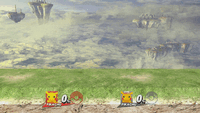
|
|---|
Taunts
- Up taunt: Huddles down and discharges electricity, saying "Piiiii!"
- Side taunt: Faces the screen and waves twice with its left paw, then its right, saying "Pika Pika!"
- Down taunt: Rolls on its back, saying "Pikaaaaa!"
| Up taunt | Side taunt | Down taunt |
|---|---|---|
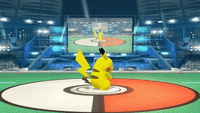
|
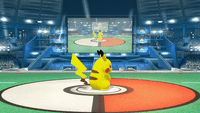
|
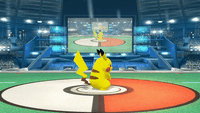
|
Idle poses
- Scratches its right ear.
- Stands up straight, then looks right, and then left, twitching its ears.
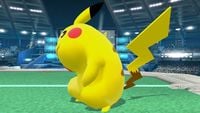 |
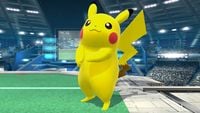
|
|---|
Crowd cheer
| English | Japanese | |
|---|---|---|
| Cheer | ||
| Description | Pi-ka-chu! | Pi-ka-chu! |
| Pitch | Group chant | Female |
Victory poses
- Twitches its ears, then scratches its right ear.
- Jumps up and somersaults while saying "Pi!", then spins around once before happily facing the camera. Its "character chosen" animation in Super Smash Bros.
- Sleeps while laying sideways on the ground, while saying "Piiika" drowsily.
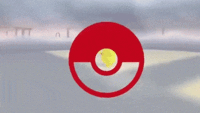 |
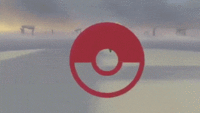 |
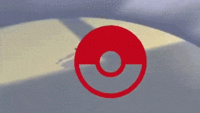
|
|---|
In competitive play
Official Custom Moveset Project
| Character | Custom sets available | ||||
|---|---|---|---|---|---|
| 1311 | 2311 | 2312 | 1312 | 1313 | |
| 1331 | 2313 | 2331 | 3311 | 1321 | |
Notable players
Trophies
- Pikachu
Pikachu is famous worldwide as the face of the Pokémon series. There's a lot of electricity stored in those rosy cheeks, and in this game, that allows for some devastating attacks, like Thunder Jolt. Tip: Input another direction after using Quick Attack to get a second burst. It's top-notch for recoveries!
: Pokémon Red and Pokémon Blue (09/1998)
: Pokémon Yellow: Special Pikachu Edition (10/1999)
- Pikachu (Alt.)
Pikachu's Thunder Jolt fires off a ball of electricity that bounces across the stage, getting weaker as it travels. Airborne enemies will take extra damage from it and get launched further. The default down special, Thunder, causes a lightning strike that both shocks opponents and turns Pikachu invincible for a split second.
: Pokémon Red and Pokémon Blue (09/1998)
: Pokémon Yellow: Special Pikachu Edition (10/1999)
- Volt Tackle
Pikachu's Final Smash turns its whole body into a powerful ball of electricity that darts around at high speed, tackling opponents. While Pikachu is charging around, press the attack button to unleash powerful sparks. There's also a little ball of light that flies ahead of Pikachu itself. Use that as a guide if Pikachu seems out of control!
For Pikachu's Final Smash, it surrounds itself with a ball of electricity and darts around at high speed, tackling opponents. While it's charging around, press the attack button to unleash powerful sparks. You can also use little ball of light that flies ahead of Pikachu as a guide if it seems out of control!
- PikachuAllStarTrophy3DS.png
Alt. (3DS)
In Event Matches
Solo Events
- All-Star Battle: Regulars: Pikachu is one of the opponents fought in this event. All of the opponents are the eight starter characters of the "perfect-attendance crew" from Super Smash Bros.
- Fire-Type Frenzy: Pikachu is one of the opponents that Charizard must defeat.
- Pokémon Battle: Pikachu is one of the opponents that Greninja must defeat.
- When Lightning Strikes: A small Pikachu and must defeat three giant Pikachu.
- Yellow Devils: As Mega Man, the player must defeat a giant Pikachu and Pac-Man, along with the Yellow Devil.
Co-op Events
- Pokémon Multi Battle!: Pikachu is one of the players' Pokémon to use, as well as being one of the opponents'.
- The Ultimate Battle: Two players select a character and must defeat the entire roster.
Alternate costumes

| |||||||

|

|

|

|

|

|

|

|
Gallery
Pikachu's appearance during the Smash Direct.
Pikachu's amiibo.
Pikachu's appearance during E3 2013.
Using Skull Bash.
Using Thunder.
Pikachu in Super Smash Bros. for Nintendo 3DS.
Pikachu, Mario, Bowser and Pit on a red plane on Pilotwings.
Pikachu behind Mega Man.
Pikachu with Mega Man.
Trivia
- Pikachu is the only playable Pokémon in SSB4 to not have a weakness to the type of another playable Pokémon.
- This is the first game in the series where Pikachu's teeth are visible. They can be seen when Pikachu is being grabbed by an opponent.
- When Pikachu is stunned, its eyes turn into swirls. This is a reference to when a Pokémon in the anime has been knocked out.
- In the Pokémon series, Quick Feet, one of Pikachu's up special customs in SSB4, is an Ability rather than an actual move, in a similar vein to Victini's and Munchlax's Poké Ball effects. However, Pikachu does not legitimately have Quick Feet as an Ability.
- Pikachu's SSB4 artwork depicts it striking the same pose as its artwork from SSB, though it is no longer slightly slouching to the side.
| Fighters in Super Smash Bros. 4 | |
|---|---|
| Veterans | Bowser · Captain Falcon · Charizard · Diddy Kong · Donkey Kong · Dr. Mario · Falco · Fox · Ganondorf · Ike · Jigglypuff · King Dedede · Kirby · Link · Lucario · Lucas · Luigi · Mario · Marth · Meta Knight · Mewtwo · Mr. Game & Watch · Ness · Olimar · Peach · Pikachu · Pit · R.O.B. · Roy · Samus · Sheik · Sonic · Toon Link · Wario · Yoshi · Zelda · Zero Suit Samus |
| Newcomers | Bayonetta · Bowser Jr. · Cloud · Corrin · Dark Pit · Duck Hunt · Greninja · Little Mac · Lucina · Mega Man · Mii Fighter (Mii Brawler · Mii Gunner · Mii Swordfighter) · Pac-Man · Palutena · Robin · Rosalina & Luma · Ryu · Shulk · Villager · Wii Fit Trainer |
